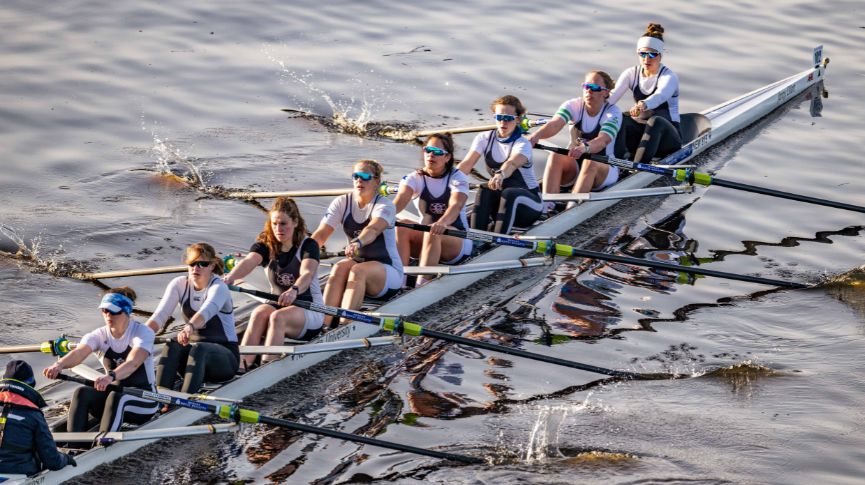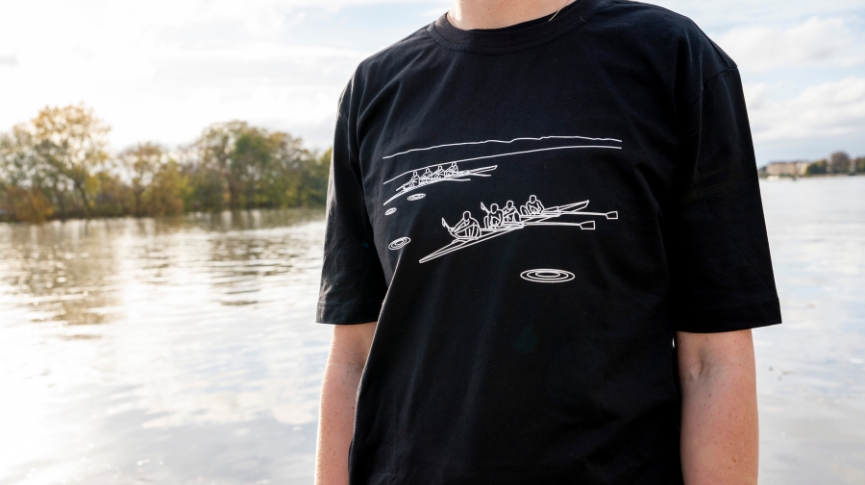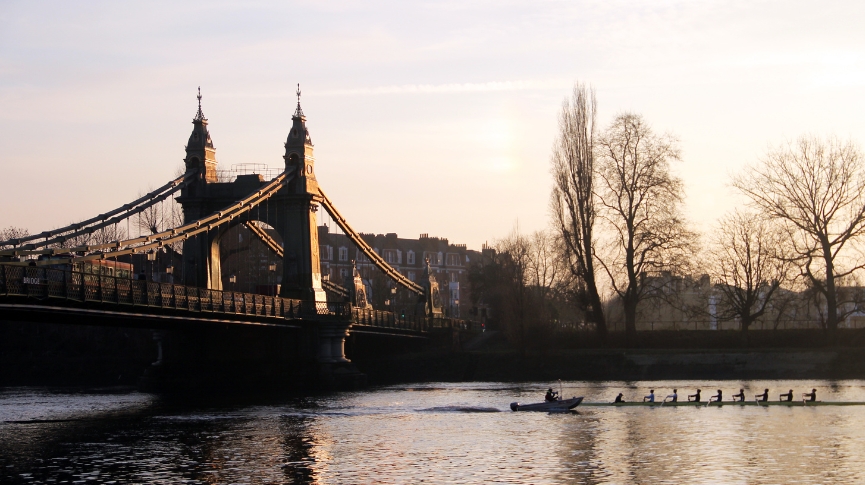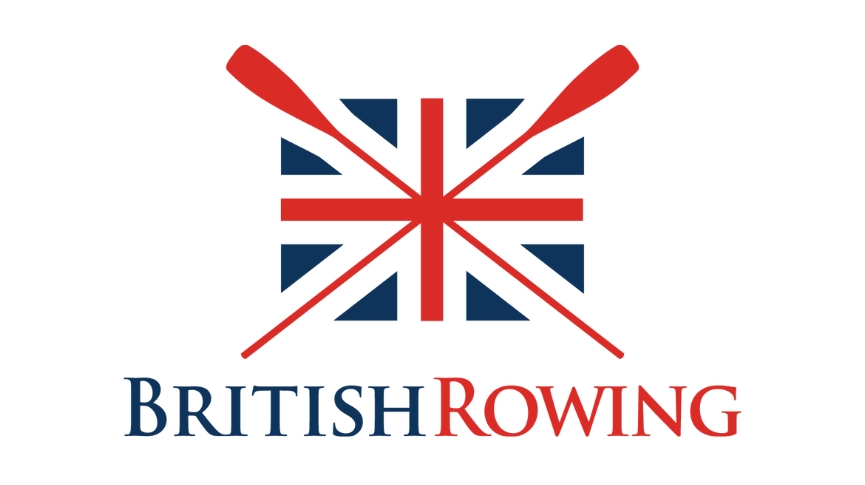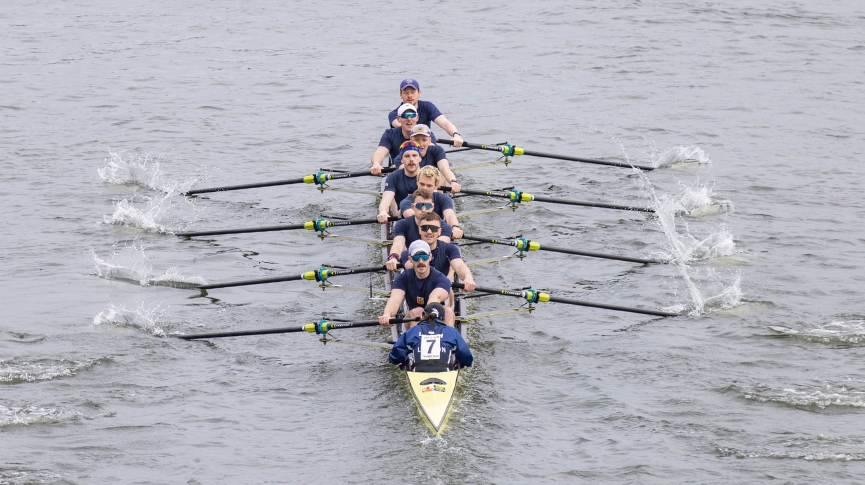Through the eyes of a junior: Reflections on fineboat waters in coastal boats
Coastal rower Dylan Hurley, Age 14, reflects on inshore rowing, blisters and making progress after Exmouth Rowing Club’s annual training camp at Wimbleball Lake in June
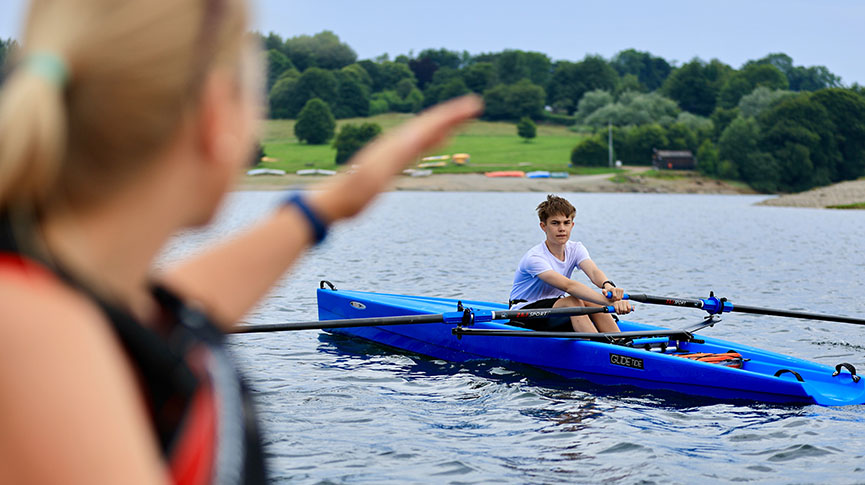
Last weekend, as part of a yearly ritual held by Exmouth Rowing Club, I travelled up to Wimbleball Lake from the tidal and comparatively unsheltered waters of the Exe Estuary and Lyme Bay. It was two days of learning, practice, light competition, great food, great people, and most of all great development. I’m not an experienced rower, having started in late October last year rowing Quads – Safrans and Rushworths – broadly once a week, with the occasional outing in my Mum’s Glideboat (a robust coastal single).
Aside from rowing I’m a regular water user spending most of my time sailing, swimming (in the summer) and powerboating. Since the grey, cold, stormy October morning when I properly began my rowing journey, there has not been a period of time where I have felt more part of a rowing community or learnt more than I have this last weekend.
“I was able to row before, however after Wimbleball, I now feel like I am truly rowing”
The structure was very simple: Friday afternoon, after work and school, saw roughly twenty regular rowers flock into the very pleasantly situated greenfield campsite above Wimbleball Lake and set up a camp. From there, Saturday held four, roughly ninety-minute sessions, with a break for lunch in the middle. Bringing with us a small fleet of Glides, two Rushworths and probably an equally sized, if not slightly smaller armada of LiteBoats, the sessions were structured so all had at least one go in a quad and four sessions across the two days spent there. Sunday had the same structure but cut the last session at the end of the day to make way for an extensive pack-up operation. It was executed with only military level accuracy and precision.
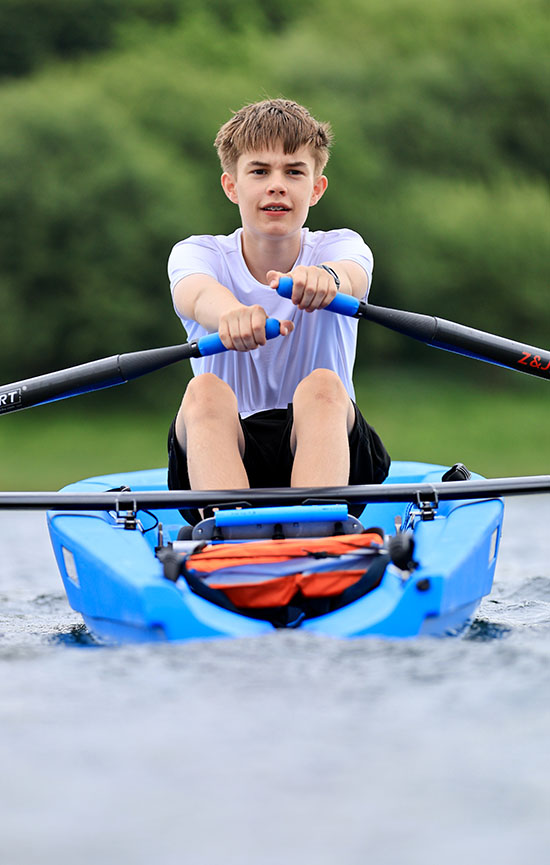 But now the context is established, I feel there is an awful lot to say about my experience, as a junior novice rower in a coastal rowing club, and as an, until now, purely coastal rower. I was able to row before, however after Wimbleball, I now feel like I am truly rowing – all down to the major advancements I achieved in technique. As one of three juniors at Wimbleball (the others being my two friends in the year above me who are twins), I can say that all of us felt a true shift in our attitude and our confidence in good rowing. Not rowing, which we could all do, but good rowing.
But now the context is established, I feel there is an awful lot to say about my experience, as a junior novice rower in a coastal rowing club, and as an, until now, purely coastal rower. I was able to row before, however after Wimbleball, I now feel like I am truly rowing – all down to the major advancements I achieved in technique. As one of three juniors at Wimbleball (the others being my two friends in the year above me who are twins), I can say that all of us felt a true shift in our attitude and our confidence in good rowing. Not rowing, which we could all do, but good rowing.
Since roughly March-April, I’d been slowly losing motivation to row – I enjoyed a Sunday morning lie-in (that being the only time I can regularly make it down to the club), I avoided pain and hard-work but most of all I felt that my rowing was not getting better; I desperately wanted to learn how to feather blades properly, and how to efficiently deliver power, and look after my back – all technique basically.
I couldn’t find the time to spend half an hour with someone, going over the motion of “rolling with your fingers” – I had been told time and time again to flatten my wrists and use my fingers, but couldn’t understand it; couldn’t see it.
But we got to Wimbleball and Saturday evening, after the day’s rowing was finished, I was having a conversation with another member and mentioned that I really wanted to get my feathering technique right. He stopped and explained it to me, gave me his full attention, his time, he demonstrated, corrected my errors. He actually grabbed my Glide’s blade and put it on top of a wall and just showed me how to do it with a blade – and like that, I understood it. I spent the rest of the evening consolidating; practicing and remembering what he’d said, and went down the next morning to row and after about five minutes of figuring it out, got it. It wasn’t perfect – it won’t be for a while. But it was the basic understanding of the right idea.
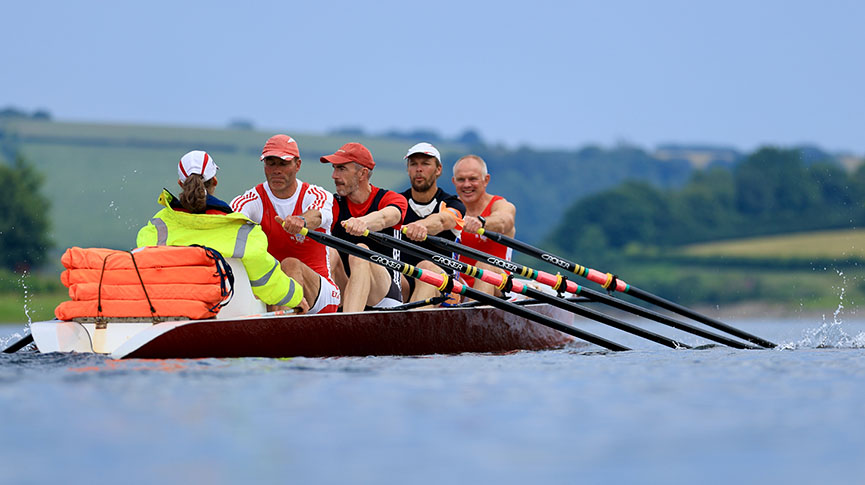
Another example would be my power delivery. I, having only really rowed quads, thought that it was good – I knew it needed refining but I thought that it wasn’t that bad… I was wrong. It needed a lot of work. It’s testament to how little you can feel when you are in a boat with other people and not completely under your own steam. My first session on Saturday was in a Glide, with my two friends’ Mum out as well. She very kindly followed me around for about 45 minutes, in torrential rain and a stiff breeze, showing me how to do everything right. The organiser of our trip this year was out in a launch moving between everyone giving them pointers (the lake is fairly large and so different groups were in different places) and between the two of them, they got me to realise the big things I was doing wrong.
“I could feel the blisters starting to generate – thankfully this time in the right places”
In the end it took one anecdote for it to click. Your engines are your legs – they do the work. Your glutes and core muscles act as a clutch, connecting the engines to the “shaft” – your arms, which in turn move the wheels – your blades. You only bend your elbows at the end, to finish the stroke and you need to keep that back straight to hold the tension and let the engines get all of their power into the water. I was bum-shoving – half of my leg-power had been used by the time I started to actually pull the blades back through the water, meaning I was using mainly my arms and back to deliver power.
Once I could think of myself as something I understand – an engine – I could suddenly row much more effectively and efficiently. Glides aren’t designed to be fast boats like Lite or fine boats – they are recreational, kick-about boats as it were. But when I realised I could, rowing efficiently, put half the power in for twice the result, I suddenly got that flood of motivation to want to get better again. How fast could I go? Just how strong are the legs? What is my optimum rate in a Glide? I reignited a spark for rowing well, on a windy lake in Somerset on a wet Saturday morning.
Looking back, I still understand I have much more to work on – like, TONS. For example, I hunch way too far and my pivot angle needs to be better and come from the hips rather than the core, and my friends have said that they need to work on similar things too.
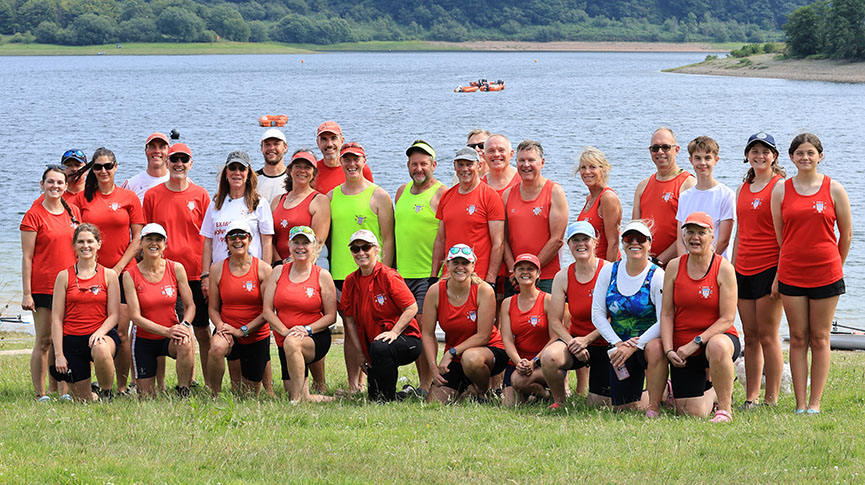
Across the course of the weekend we spent a lot of time together, us juniors, mainly dog-sitting on our off-sessions as many of our club members brought their dogs with them. In particular we looked after Daisy and Dougal, two very beautiful but energetic spaniels, who required three 5k walks a day to stay happy. On these walks, to the dam at the other end of the lake and back, we discussed our club, and what we had learnt, how tanned and sore we were, but mostly how much fun we were having. I think it was probably a mixture of close proximity through camping and bonding over the experience of rowing inshore but as a club, we all had a lot of fun together – it was a good time. We have a real community, and as someone learning to row in that, having a culture where everyone is happy, and willing to help you, I feel incredibly lucky that I can utilise that.
“So we stood there, just a few metres from our boats and the lake, waiting to get out. Until someone said “Well I’m going” and walked out, at which point, rather sheepishly, the ones on that session followed.”
The other thing that made our short time at the lake so productive was that we didn’t really have to worry about much. Not just in the sense that we had nothing on our minds but also in that we are so used to thinking about the tide and sandbanks. We spend a lot of time trying to control where we’re being taken by currents so having only really the wind and other rowing boats to think about freed up a lot of brain space, and we capitalised on it.
The best part, I think, about the experience was that it was a perfect balance. It was hot and sunny most of the time, but the rest it was raining – proper raining. We found ourselves on Sunday morning – twenty of us – huddled under a small red gazebo that we use as the race office for home regattas. It was 45 degree angled rain outside thanks to the wind and it was not only twenty humans but dogs and bags too. Bathed in the eerie red light we joked and laughed, and discussed the plan for the rest of the day. The campsite is much further up above the lake, maybe four hundred metres and so running back to tents wasn’t really an option. So we stood there, just a few metres from our boats and the lake, waiting to get out. Until someone said “Well I’m going,” and walked out, at which point, rather sheepishly, the ones on that session followed. And twenty minutes later it was blue skies again.
The ongoing fight with blisters was another feature of our time. The debate around whether to wear gloves or not was very divided. Sunday in particular was a day that I grew.
I was meant to be on two sessions but in the end went rowing four times. My first session was in a Glide, practicing my newfound technique in feathering and posture from the day before.
Roughly following the other small boats we set off, where I set myself the challenge of staying at the front – which as it turns out, is not so hard when you’re rowing properly. We followed from the main part of the lake down a channel maybe 150 meters wide to a t-junction where to the right is a dam and to the other is a two, maybe three kilometre channel that slowly narrows before coming to an end with a little beach. Now, on Saturday, I’d been very curious about where this channel went, and on Sunday morning took my opportunity to find out. So, driven by curiosity, I followed this channel, which, as a coastal rower, I immensely enjoyed, following between two banks, surrounded by beautiful dense forest. I got to the end, turned around and started heading back (with the others heading back as well).
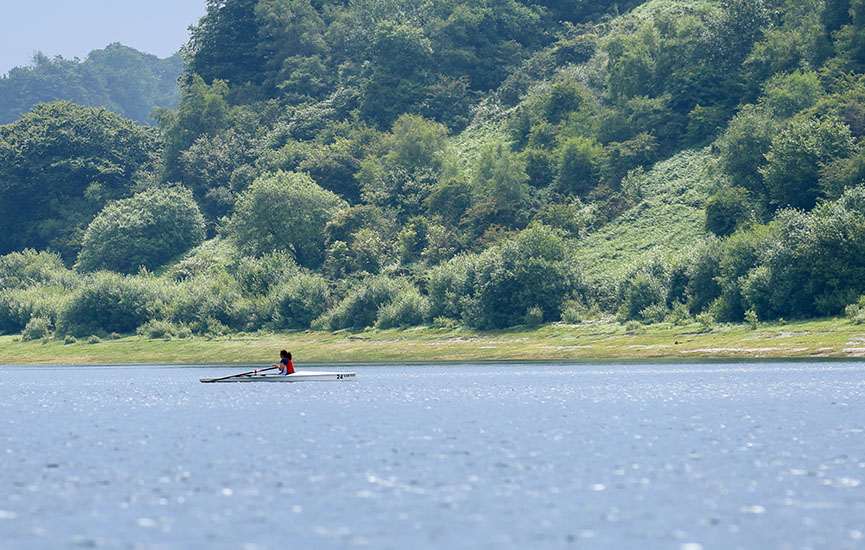
I could feel the blisters starting to generate (thankfully this time in the right places – fingers and pads, not palms) and I was getting tired, and afterwards I was told by my friends’ Dad (another person who massively helped me this weekend) that my technique did start to go. But we got off the water and I was told I’d rowed 8k. And although to most rowers that may not seem like much, to me it was huge because, although I had a couple of nasty blisters and tired legs, it wasn’t that bad… Of course it felt like forever while fighting the wind on the way back but half an hour of crouching in a gazebo in heavy rain later, I was ready to go again. And I did another 5k. And it hurt. But if there’s one thing that my weekend at Wimbleball Lake taught me it was that if you can do something right when you’re in pain, you can do it really well when you aren’t. This weekend was a testament to the generosity of my fellow rowers in helping to better everyone around them, teach novices and build a community that we, as junior novice rowers, feel happy and safe in.
Inshore lake rowing was a new experience but helped me hugely in getting my technique together, and learning how to deal with fatigue and challenges in a solo situation. I will always love coastal rowing but getting the experience of spending time away from the tide is a huge bonus for all rowers, and vice versa. I believe that one of the biggest areas of bettering your rowing is spending time in new water, a different type of water, maybe in a different boat. I know for a fact that this weekend I fell in love with rowing a single. It helped me feel what I was doing right and wrong. But if there’s one takeaway from this, it’s that community spirit and connection with other people is hugely important. I will always go and see my friends first and my preference will be to row with them, but if I want to spend the day really upping my technical rowing level, I will go and talk to an experienced rower who I know, or maybe someone who I haven’t really gotten to know, because their experience might just relate to me, and help something click.
About the Author
Dylan Hurley was born in Devon and has never lived more than 100m from the sea. He comes from a nautical family with his mother, Kate, having rowed with Exmouth Rowing Club for around 20 years and his father, Tom, working as an offshore photographer covering sailing and rowing events for many years. In addition to rowing, Dylan is an experienced dinghy sailor, instructing with Exe Sailing Club, and holds his RYA Level 2 Powerboat Certificate.
Dylan’s grandfather, Graham Hurley, was a regular author for Rowing and Regatta.


